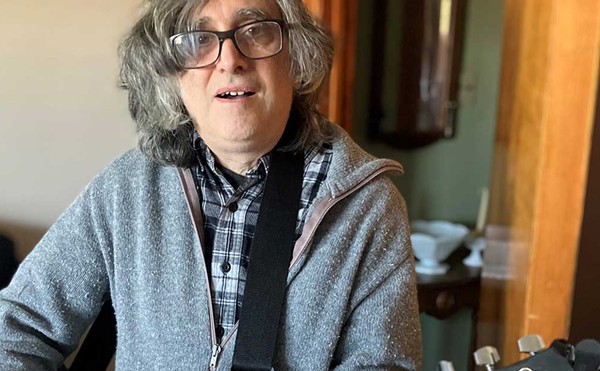Arguably the most famous living composer and a virtual legend in world performance circles, Glass, whose résumé is enormous, is perhaps best known for being a co-founder, along with fellow composers Steve Reich and Michael Nyman, of the minimalism movement. Beginning in the early '70s and drawing on Third World musical traditions, this new approach to the sublime in classical music launched blocks of repetitive, ecstasy-inducing motifs and melodic fragments at audiences eager to experience a departure from composition as usual.
Like composers of earlier eras, Glass has written for the theater, dance and cinema, as well as for orchestras and soloists; remaining close to the font of popular culture is very important to him. Nowhere is this more evident than in his score for Martin Scorsese's recent film, Kundun (1997), about the 14th Dalai Lama. Both score and film were nominated for Oscars.
"I consider myself very fortunate to be able to work in so many different areas, particularly in Hollywood," says Glass.
"It has long been my opinion that composers in the current period have been way underused by Hollywood. Now it's true that John Williams and John Barry and Danny Elfman get a great deal of work, but they primarily compose for the screen, for a particular project. But I am talking about those of us who work in different mediums and therefore bring something new to Hollywood itself, which we all know is terribly concerned these days with its bottom line, profit. For me, art and entertainment should, and actually do, intersect far more than they are given credit for."
Glass has written music for a number of film directors during his long career. He worked with Errol Morris on the score for The Thin Blue Line (1988), Paul Schrader on Mishima (1985), Geoffrey Reggio on his trilogy, Koyaanisqatsi (1983), Powaqqatsi (1988) and Anima Mundi (1991), and Christopher Hampton's excellent-but-obscure adaptation of Joseph Conrad's short story, The Secret Agent (1996). Glass also composed an opera around Jean Cocteau's 1946 classic La Belle et la Bette (1994) and has written a new score to be performed by the Kronos Quartet around the original U.S. film version of Dracula (the 1931 release starring Bela Lugosi).
"I am essentially a subject matter composer," explains Glass. "I like to work with primary texts and images and write around them. And this has been true since my earliest operas, Einstein on the Beach (1976) and Satyagraha. (1980). I am fortunate, like, say, Verdi or Mozart was, to be able to work in popular idioms as well, like working with the techno producer Aphex Twin, or choreographers like Twyla Tharpe or rock musicians like Eno and David Bowie, and in popular cinema like Kundun, which is to take image and/or movement and write to them and create environments around them -- or in the case of my symphonies, Low (1993) and Heroes (1997), to reinterpret them in another context.
"In film, what has happened with the subject matter is that, typically, you are not allowed a lot of input or freedom," he continues.
"I usually find myself composing to the images on the screen, and I am sure this is how other composers for film work. But with Kundun, it was very different. I had been composing music before Marty actually started filming. In that sense, I was treated more like a collaborator. I was able, because of Marty's generosity and vision, to enhance the moving images, and have the images and music react to and juxtapose against one another.
"What happened with Kundun and in The Secret Agent is that something new is afoot in the cinema. It hasn't exactly caught on in Hollywood yet, but I am hoping it will and I want to do what I can to facilitate that, even if it sounds pretentious -- being an actual collaborator with a director and producer, instead of highlighting the film as it already exists. It will extend both mediums -- music and film -- in ways we can't even predict yet."
Glass has been on the Buddhist path for more than 30 years. When asked whether the scoring of Kundun was different because of its subject matter (Tibet and the Dalai Lama, in particular, and Buddhism in general), he muses a bit, then answers genuinely and enthusiastically.
"I think that for me that was an attraction. But anyone interested in history as well would have been thrilled to work on that project with Marty. And what composer wouldn't want to work as an actual collaborator in that context?"
Glass, along with the Patti Smith Group, and R.E.M.'s Michael Stipe -- in a rare solo acoustic performance -- will be appearing at the Second Annual Allen Ginsberg Memorial Concert Friday, October 2 at Hill Auditorium in Ann Arbor. The concert benefits Jewel Heart, an international Tibetan cultural and Buddhist studies center. The organization (Glass is a member, as was Ginsberg) has its main chapter in Ann Arbor. Its founder and spiritual director, Gelek Rinpoche, seen as an incarnate Tibetan lama, resides there.
So how does Glass view the recent popular interest in Buddhism among artists, entertainers and the consuming public in general? Does this visibility enhance or inhibit his own practice of Dharma?
"I have been hearing for a while now, because of people like myself, Adam Yauch (Beastie Boys), Allen Ginsberg, Leonard Cohen, Richard Gere and others, that Buddhism -- no matter what kind, but Tibetan Buddhism in particular -- is a passing thought. If it is, it has been a passing thought for 25 years. Sure, people come and go, some well known -- but let's face it, Buddhism is not a New Age cult or anything, but a world religion. I have even heard from David Bowie that he is a Dharma practitioner. Buddhism is still in its infancy in the West, so if it takes 100 years to become part of the cultural fabric in America, in the same way that, say, Christianity is, so be it. America, as well as anywhere else, has much to benefit from the Dharma." Thom Jurek is a music writer living and working in Ann Arbor. E-mail [email protected]





